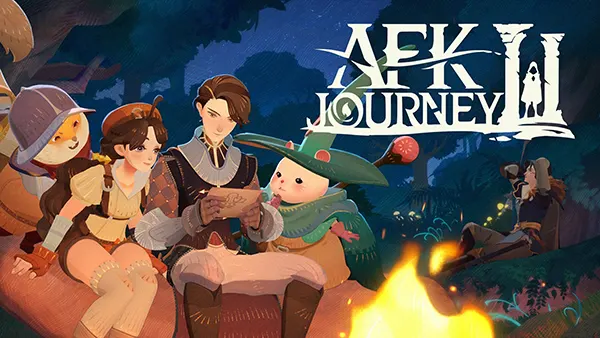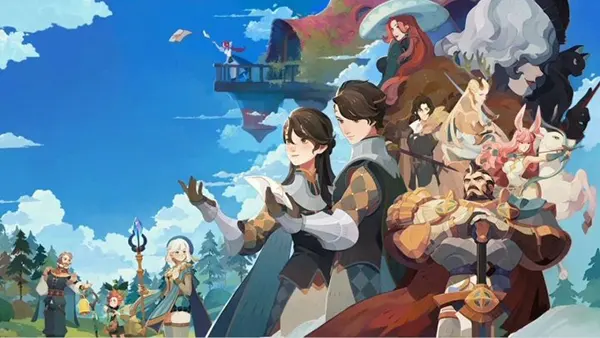
AFK Journey — Strategy with Automated Gameplay and Tactical Battles
AFK Journey, released in 2024 by Lilith Games, continues the legacy of AFK Arena with a fresh approach to role-playing strategy. By combining automated progression with tactical battles, the game offers a balance between convenience and deep strategic decision-making. Players are invited to build powerful teams, explore a vibrant open world, and engage in battles that reward both planning and adaptability.
Game Overview and Core Mechanics
At its core, AFK Journey is designed as a hero-collector RPG where progression happens even when the player is offline. This feature makes it accessible to both casual and dedicated players, ensuring that resources such as gold, gear, and experience are accumulated automatically. This system removes the pressure of constant grinding, while still rewarding those who log in regularly.
The game introduces a 3D open world, a notable evolution from the 2D environments of its predecessor. This shift allows for greater exploration, environmental puzzles, and the discovery of hidden treasures. Maps are filled with interactive elements, creating a more immersive experience for those who prefer hands-on gameplay alongside automation.
Heroes belong to different factions and classes, and each comes with unique skills that influence battle outcomes. Building a balanced team that takes advantage of faction bonuses and class synergies remains essential for success, especially in advanced stages where enemy setups become increasingly complex.
Automated Progression Explained
The automated system in AFK Journey is central to its identity. When players are not actively engaged, their heroes continue fighting in the background, generating resources. This model ensures steady progression without requiring players to spend hours grinding repetitive tasks.
Daily rewards and idle chests provide resources that can be used to level up heroes, unlock gear, and expand a roster. Importantly, the game avoids pay-to-win pitfalls by balancing free and premium resource distribution. Dedicated free-to-play users can remain competitive if they focus on team composition and efficient use of materials.
Automation is balanced with active participation. While offline gains keep heroes progressing, real tactical decisions during battles—such as formation, skill timing, and hero synergy—determine victory in tougher encounters. This duality appeals to a wide player base.
Tactical Battles and Strategic Depth
Combat in AFK Journey is more than just watching heroes fight automatically. Players can manually adjust team formations before each battle, which significantly influences outcomes. Positioning determines whether tanks can absorb damage effectively and whether damage-dealers are protected.
Each hero’s abilities introduce layers of strategy. Ultimate skills, which charge over time, can be unleashed at critical moments to turn the tide of battle. Choosing the right moment to trigger these abilities separates successful players from less prepared ones.
Faction bonuses play a pivotal role in battle strategy. Deploying heroes from complementary factions can grant bonuses such as increased attack power or resilience. This system encourages experimentation and adds replay value, as players constantly refine line-ups to counter different enemy setups.
Challenges and Competitive Modes
Beyond the story campaign, AFK Journey features a range of challenges and multiplayer modes. The King’s Tower and Dream Realm push players to test their tactical skills against stronger foes with unique battle conditions. These modes reward rare resources and encourage long-term engagement.
Player versus Player (PvP) arenas bring competition to the forefront. Here, formations and timing become even more important, as opponents adapt strategies over time. Success in PvP requires both a strong hero roster and a keen understanding of meta-trends in the player community.
Guild-based activities add a cooperative layer to gameplay. Players can team up to fight powerful bosses, share resources, and climb leaderboards together. These systems foster community and give additional reasons to optimise teams.

Visuals, Sound, and Overall Experience
AFK Journey’s visuals mark a departure from its predecessor, adopting a vibrant cel-shaded 3D style. The aesthetic draws inspiration from animated fantasy films, making environments and characters stand out with personality. Smooth animations enhance the immersive feel during both exploration and combat.
Sound design complements the visual style with orchestral tracks, thematic battle music, and distinct character voices. These elements contribute to the sense of progression, making exploration and battles more engaging. Voice acting adds depth to character interactions, enriching the storytelling aspect.
Overall, AFK Journey blends casual-friendly features with deep strategic layers. The automated progression makes it easy to return after a break, while tactical combat ensures players remain engaged. As of 2025, the game has established itself as one of the most accessible yet strategically rewarding titles in the mobile RPG genre.
Why AFK Journey Stands Out
Unlike many mobile RPGs, AFK Journey strikes a rare balance between automation and meaningful interaction. It respects the time of casual players while offering enough depth to satisfy those who enjoy tactical decision-making. This inclusivity broadens its audience significantly.
Regular updates from Lilith Games ensure that the title remains fresh. New heroes, seasonal events, and competitive adjustments are introduced consistently, which keeps both the meta and the gameplay dynamic. Community feedback is often integrated, strengthening player trust in the developers.
As mobile gaming continues to expand, AFK Journey demonstrates how a hybrid model—mixing idle mechanics with tactical gameplay—can define success in the industry. Its longevity seems secured by a combination of accessibility, innovation, and active community support.
